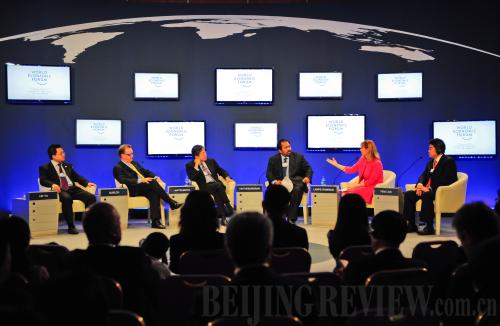|
 |
|
HOT DEBATE: A panel of experts participates in a discussion entitled Demystifying Asia's Entrepreneurs at the 2012 Summer Davos in Tianjin on September 11 (ZHANG CHAOQUN) |
"If developed countries continue their protectionism and discriminatory regulations, China's economic slowdown will eventually threaten the development of the whole world," said Xiao.
In July, Germany's solar energy company, SolarWorld, and several European enterprises launched an anti-dumping probe with the European Commission against Chinese solar power companies, alleging that Chinese firms were selling products in European markets at prices lower than at home, thereby threatening to run European companies out of business.
The EU announced on September 6 that it would launch a 15-month investigation into imports of solar panels and key components from China and may impose provisional anti-dumping duties within nine months.
The case is the largest trade dispute in trade volume involving China. The EU has been the biggest importer of China's solar products. In 2011, the EU imported photovoltaic (PV) cells worth of $20.4 billion from China, about 73 percent of the total export during the period, according to the Ministry of Commerce.
At the forum, Chinese solar panel makers made their voices heard, calling for freer trade and open collaboration with foreign competitors.
The anti-dumping investigation by EU enterprises has stood in the way of solar energy becoming cheaper around the globe, said Gao Jifan, Chairman and CEO of Trina Solar, a leading solar company in China.
Gao was quite confident the trade friction between China and the EU would be resolved through negotiation and further dialogue.
Gao added that China should intensify efforts to explore the domestic market to expand its PV industry. China should not only be the largest PV maker but also its largest consumer. China's solar energy industry will see more opportunities through 2020 as new solar energy-oriented systems are being formed, Gao said.
Amid global economic chaos, China's manufacturing sector is losing its competitiveness as global investment shifts to lower-cost countries.
The sector is facing a choice: maintaining the traditional competitiveness of low-end manufacturing or striving for high-end innovation.
At a televised debate called The Next Manufacturing Frontier at the forum, all five panelists believed China's future in manufacturing belonged to producing high-end goods.
Xu Heyi, Chairman of Beijing Automotive Group, the country's fifth largest automotive group, and one of the panelists, couldn't be surer about China's future.
"China definitely should choose the path of high-end manufacturing in a bid to transform its manufacturing sector," said Xu.
"High-end has two meanings—high-end products and the high-end of the industrial chain. For instance, a large portion of the iPad and iPhone was made in Guangdong Province. But that was the lowest-end of the production chain—the assembly part," said Xu.
If China's manufacturing sector wishes to further develop, it must insist on a more high-end strategy with more innovation. For the auto-making industry, joint venture brands have occupied the Chinese market while China's self-owned auto brands are seeing a declining market share. This is a huge challenge for China, said Xu.
Email us at: zhouxiaoyan@bjreview.com | 